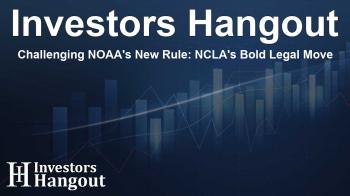Challenging NOAA's New Rule: NCLA's Bold Legal Move

NCLA Takes Legal Action Against Fishery Monitoring Regulations
The New Civil Liberties Alliance (NCLA) is making headlines as it appeals a significant District Court ruling that upheld the National Oceanic and Atmospheric Administration's (NOAA) controversial monitoring rule for Atlantic herring fishermen. This development follows a Supreme Court decision that sought to challenge established agency authority by dismantling the Chevron doctrine, which previously allowed for leniency towards agency interpretations of statutory mandates.
The Implications of the Chevron Doctrine Reversal
With the effective end of Chevron deference, courts are called upon to assess agency actions directly based on the explicit language of statutes. The implications are profound for industries reliant on regulatory oversight, such as fishing. The case in question stems from NCLA's pursuit to invalidate the Herring Rule, which requires fishermen to bear the financial burden of government monitoring.
The Background of the Case
This situation has arisen from a July ruling by the U.S. District Court for the District of Rhode Island, which sided with NOAA despite the Supreme Court's earlier guidance that emphasized administrative power should not exceed statutory intent. NCLA's determination is to have the First Circuit Court of Appeals reconsider this decision, thus aligning current laws with the original intent of Congress.
Why This Matters to Fishermen
The crux of the NCLA's argument is that the Magnuson-Stevens Fishery Conservation and Management Act does not grant NOAA the authority to mandate such financial responsibilities onto fishermen. As the fishing industry continues to navigate tightening regulations, this legal challenge raises critical points about fairness and agency overreach. Fishermen, already facing numerous challenges, should not be further burdened by the costs of government operations.
NCLA's Legal Victory and Its Repercussions
In a landmark achievement last year, NCLA successfully prompted the Supreme Court to strike down the Chevron doctrine, heralding a new era where judicial evaluation overrules administrative agencies’ interpretations. This paradigm shift in legal authority not only restores judicial checks but also places the interpretation of laws firmly within the judiciary's purview.
Community Reactions to New Developments
NCLA’s efforts have garnered accolades within legal advocacy circles, including recognition from organizations committed to civil liberties. According to NCLA officials, this victory signifies not just a win for fishermen, but a broader triumph for citizens who rely on the rule of law to protect their rights against bureaucratic excess.
Statements from NCLA Representatives
NCLA representatives have expressed strong sentiments regarding the ramifications of these legal battles. Senior Litigation Counsel John Vecchione stated, "The Supreme Court has ruled silence does not confer power on agencies. A presumption that salaries of government monitors should be paid by fishermen and not the government cannot be allowed to insert deference to agencies under another name."
Kara Rollins, another counsel with NCLA, emphasized the baffling nature of continuing to challenge fishermen despite previous rulings, highlighting a disconnect within the administration. Meanwhile, NCLA President Mark Chenoweth criticized ongoing government efforts to defend NOAA's monitoring rule as counterproductive and urged more sensible governance.
Conclusion: A Call to Action
The outcome of NCLA's appeal will resonate throughout the fishing community, potentially altering the landscape of agency regulation and oversight. Fishermen across the New England region are vigilantly watching NCLA's efforts to quash unlawful regulatory measures. As the appeal progresses, it will undoubtedly shape the future engagement between federal agencies and the fishing industry.
Frequently Asked Questions
What is the nature of NCLA's appeal?
NCLA is appealing a ruling that upheld NOAA's requirement for fishermen to pay for at-sea monitors.
What is the Chevron doctrine?
The Chevron doctrine allowed agency interpretations of ambiguous statutes to go unchallenged, providing them with significant power.
How does this affect Atlantic herring fishermen?
Fishermen may face significant financial burdens due to the requirement to fund government monitoring under the Herring Rule.
What does NCLA aim to achieve through this legal challenge?
NCLA aims to overturn the Herring Rule and the Industry-Funded Monitoring program, reaffirming judicial authority over agency regulations.
Who are the key figures in this legal battle?
Key figures include John Vecchione, Kara Rollins, and Mark Chenoweth from NCLA, who are actively advocating against NOAA's rule.
About The Author
Contact Owen Jenkins privately here. Or send an email with ATTN: Owen Jenkins as the subject to contact@investorshangout.com.
About Investors Hangout
Investors Hangout is a leading online stock forum for financial discussion and learning, offering a wide range of free tools and resources. It draws in traders of all levels, who exchange market knowledge, investigate trading tactics, and keep an eye on industry developments in real time. Featuring financial articles, stock message boards, quotes, charts, company profiles, and live news updates. Through cooperative learning and a wealth of informational resources, it helps users from novices creating their first portfolios to experts honing their techniques. Join Investors Hangout today: https://investorshangout.com/
The content of this article is based on factual, publicly available information and does not represent legal, financial, or investment advice. Investors Hangout does not offer financial advice, and the author is not a licensed financial advisor. Consult a qualified advisor before making any financial or investment decisions based on this article. This article should not be considered advice to purchase, sell, or hold any securities or other investments. If any of the material provided here is inaccurate, please contact us for corrections.

